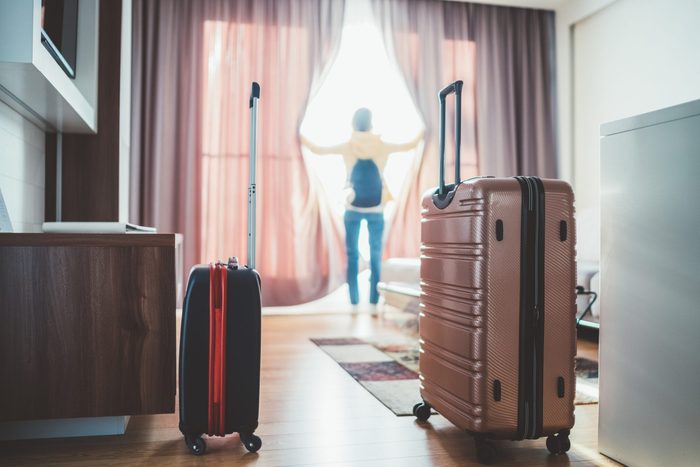
Looks can be deceiving
Since so many people stay in hotel rooms, perhaps it shouldn’t come as all that much of a surprise that those rooms aren’t always as clean as they should be. In one pre-COVID study—and only read on if you have a strong stomach—81 percent of hotel surfaces contained at least some fecal bacteria. But that was before the pandemic, so things must be different now, right? Not necessarily. One study from September 2020 published in the journal Emerging Infectious Diseases found COVID germs on eight of 22 hotel room surfaces tested, as well as on the pillow covers, sheets, and duvets of two rooms where presymptomatic people who then tested positive stayed. Although the amount of COVID particles needed to actually make you sick is still up for debate, and the rooms in the study hadn’t been cleaned yet, the report highlights the need for rigorous sanitation protocols to eliminate any germs left behind by a previous guest.
While travel experts say they trust certain hotels to be super clean, here’s the general issue: Hotels are in the business of making money, and especially after the hospitality industry was so hard-hit last year, one way they keep more of that money is by cutting corners. Today, cleanliness is more important—and more important to guests—than ever. Yet there have been few investigations on how well hotels are sticking to their new cleaning guidelines. Some recent anecdotal reports from guests have given hotel cleanliness mixed reviews, and because of the dirtiness that was often commonplace pre-COVID, it’s better to be safe than sorry. You should also be aware that some spots are dirtier than others. Let’s take a look.
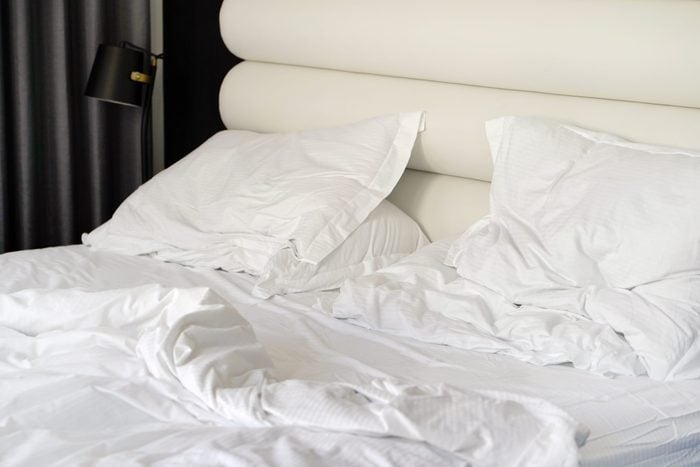
They’re reusing the sheets
Although this was an issue before COVID-19, it seems almost unthinkable today—but it’s still a problem. Previously, if there weren’t visible stains, some hotels didn’t clean the sheets regularly between guests, says Philip Biton, the cofounder of NDOband, who also helps hotels find ways to generate money from their rented rooms. According to a 2016 Inside Edition investigation, three out of nine hotels tested secretly didn’t change sheets (insert vomit emoji). Disturbingly, an Inside Edition report from June 2020 found the same unnerving results in at least three hotels in New York City—the Hyatt Place in Times Square, the Hampton Inn Times Square Central, and Trump International. These hotels didn’t change all the linens or clean thoroughly between visits, the report found, despite the stringent COVID-19-related cleaning measures that hotels should be following right now.
Of course, sheets should always be replaced, says Biton. After all, bodily fluids, hair, and germs from previous guests could be lurking there. In your own home, this is how bad it is to not wash your sheets every week, never mind at a hotel, with multiple people you don’t know rolling around on them. Pro tip: Ask the hotels to change the sheets (again?) after you’ve checked in and before you get comfy.
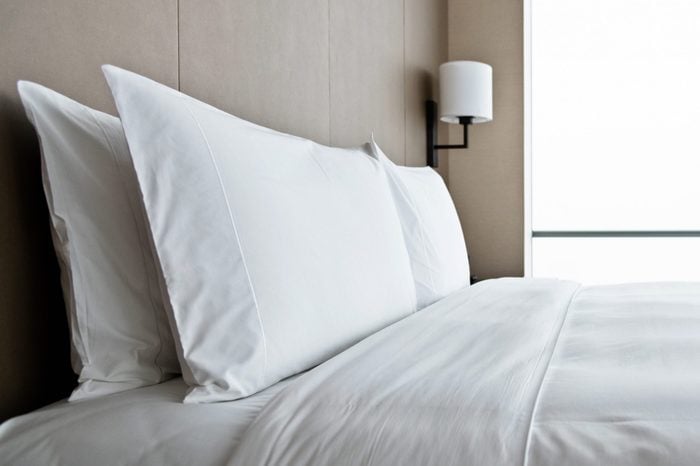
They’re neglecting the pillowcases
The linen problem doesn’t just affect the sheets—an even greater health risk is found at the spot where you lay your head. According to the 2020 Emerging Infectious Diseases study, COVID-19 can be left on pillows used by presymptomatic patients. Hotel beds are piled high with pillows, which may lead housekeepers to cut corners if it doesn’t appear as though a pillowcase is dirty, as the June 2020 Inside Edition report found.
We know this happened pre-COVID: When the Today Show investigated top hotel chains in the United States in 2014, they found that many of the housekeepers put the pillows on the chair next to the bed while they changed the sheets. Then, they fluffed the dirty pillows and put them right back on the bed: No visible stains equals a reuse. The pillowcases last longer that way, saving hotels even more money in the long run. That this could still be happening now is a serious cause for concern, so our advice? BYO pillow. Here’s one thing you can still learn from hotels: how to get perfectly fluffed hotel-like pillows at home.
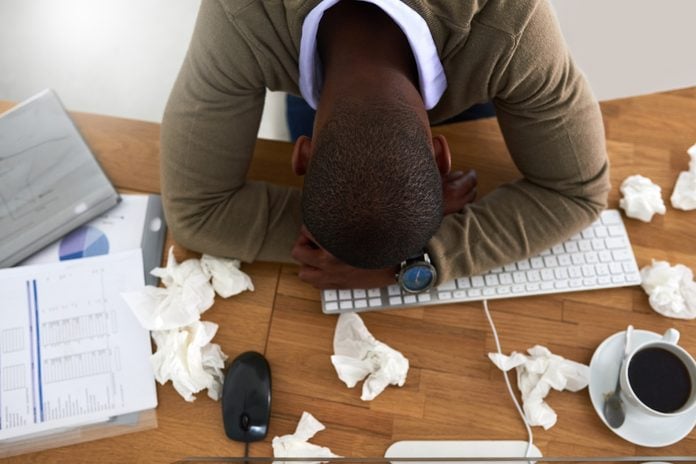
They’re letting sick employees continue to work
The stakes are high when it comes to COVID-19, but apparently, the economic stakes when it comes to employees are even higher for some hotels—even when they go against CDC guidelines. At the Holiday Inn LAX, when an employee told her bosses that she had a headache and body aches, she was given the day off to take a COVID-19 test but continued working until she received her positive result, according to NBC.
How could something like this happen? According to Jon Jarosh, a spokesman for Destination Door County in Wisconsin, many businesses are struggling to find and maintain employees due to all of the travel restrictions right now (though he didn’t say that this is affecting the cleanliness of the Door County properties). While there isn’t much you can do about other people’s actions or inactions, you should regularly wash your hands, engage in proper social distancing, and wear a mask whenever you’re not in your hotel room. Here are more eye-opening facts that will convince you to wear a mask.
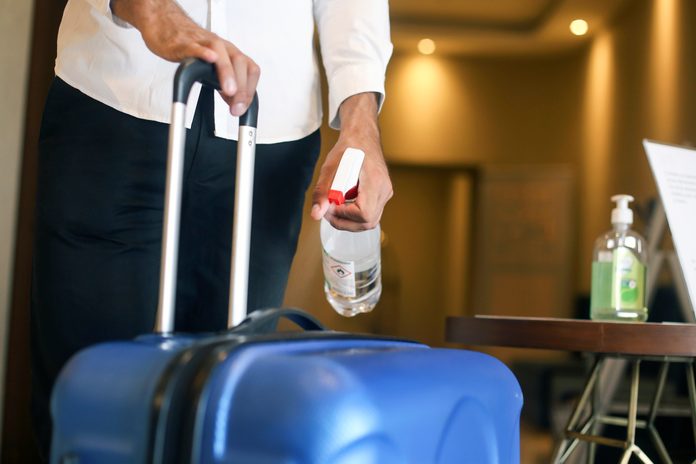
They may allow COVID-19-positive guests to stay there
Even if the hotel disinfects the rooms and the chlorine kills the virus in the pool, there may be COVID-19-positive guests lurking behind closed doors. And we’re not just talking about people who don’t disclose (or know about) their COVID-19 status. According to the Santa Clara County Public Health Emergency Operations Center, lodging facilities in California are allowed to provide rooms for COVID-19-positive guests as long as they’re in an isolation area consisting of at least five percent of the total available rooms of the facility and they’re all adjacent to one another. If there are fewer than 20 rooms at the hotel, at least one room must be reserved for an isolation area. If possible—and, of course, it’s not always possible—the isolation area must have entrances and exits directly to the outdoors. Those exhibiting possible COVID-19 symptoms but who do not have a positive test are also allowed to stay but are supposed to isolate in their rooms. Of course, “supposed to” is the key phrase there. Make sure to ask your hotel about its policy on COVID-positive guests before you book.
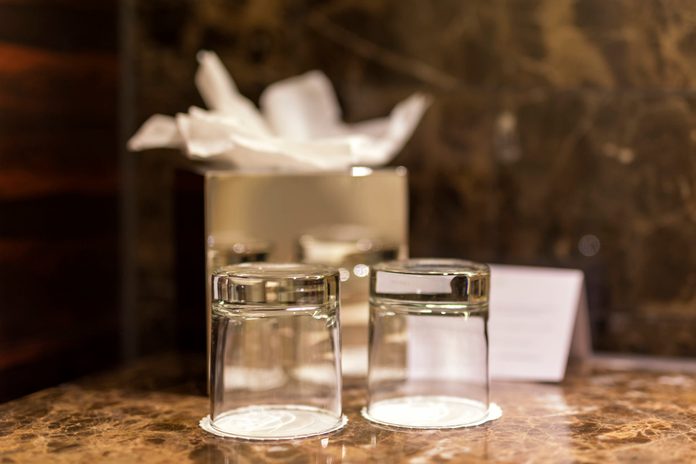
They may continue to skimp on washing the glasses
Unfortunately, there are no international standards for the cleanliness of a hotel, even in these times. And it’s easy to make a glass look clean: You simply have to rinse it under some water or quickly wipe it with a towel, especially if the previous guest only drank water out of it. If the housekeepers have limited time to clean each room, there’s a good chance they’re going to save some of those precious minutes by not washing the glasses properly. We know this happened pre-COVID: An undercover investigation by ABC News in 2009 revealed that 75 percent of the glasses examined had just been wiped down and rinsed out instead of being properly sanitized. Other investigations at various hotels found that cleaning staff washed the glasses with dirty cloths and with spray that was not suitable for drinking.
While there haven’t been any post-COVID-19 studies about the state of the glasses, many hotels have replaced their glasses with disposable ones. It’s not as environmentally friendly, but it’s safer at the moment. Pro tip: Don’t risk it if you do see those glasses, and instead, bring your own reusable water bottles when you stay at a hotel, just in case.
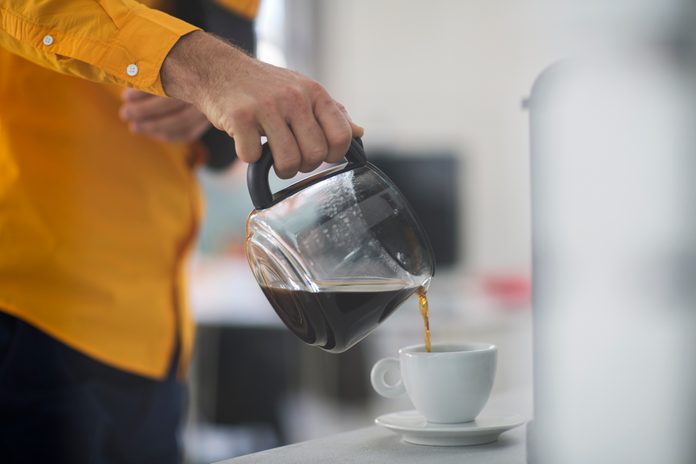
They may not wash the coffeepots
Let’s be honest here: When was the last time you washed your own coffeepot? Exactly. Because of the pandemic, many hotels have removed their in-room coffeepots—which is probably a good thing, since they previously didn’t wash them any more than you clean your own. One pre-COVID ABC News exposé found that hotels weren’t using soap or any other cleaners to clean their coffeepots, and researchers from the University of Valencia examined nine Nespresso machines that had only been used for a year and found bacteria in all of them. (There hasn’t been a study post-COVID-19.) That’s why we bring our own mini French Press with us when we travel, and why you should do the same—or, if you find a coffeepot in your room, clean it thoroughly before using, says USA Today. Coffeepots are among the things you might not see in hotels anymore.
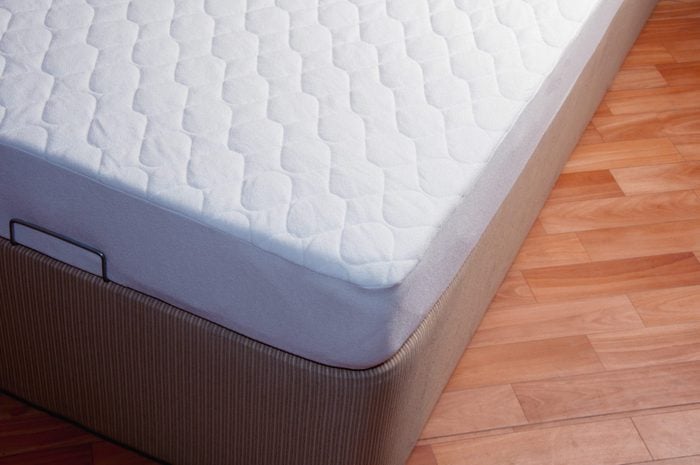
They might not change their mattresses
Mattresses are expensive. As a result, high-end hotels tend to change their mattresses every three to five years, while less expensive hotels will change mattresses every ten years, according to Traveller.com. Since most hotels have been empty and suffering from the economic impact of COVID-19, it’s unlikely they’re changing their mattresses now. Even if the mattress is torn or stained, many hotels will simply hide or clean the issue, as it’s too expensive to swap out a mattress every time there’s a problem.
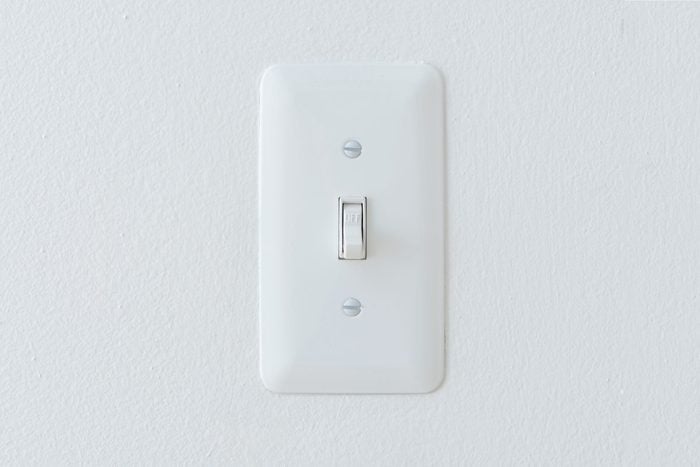
The light switch may be missed
We all touch them multiple times per day, so the CDC clearly says these “high-touch” surfaces should be cleaned by hotel housekeeping. The Emerging Infectious Diseases study also found that those infected with COVID-19 can shed the virus on light switches, though items that received “prolonged contact,” like sheets and pillowcases, contained a higher viral load. Pre-COVID, the light switches in hotels weren’t cleaned properly—or maybe ever, say researchers from the University of Houston. In the study, housekeepers didn’t have time to wipe down everything and also inadvertently carried bacteria to multiple rooms by reusing the same sponge and mop. As a result, bacteria in the hotel rooms were found to be between two and ten times higher than the levels accepted in hospitals.
It’s possible hotels have changed their tune, but it’s not unreasonable to question if that’s so: The 2020 Inside Edition investigation also found that high-touch surfaces like TV remotes and thermostats were not always cleaned. That’s why you should clean everything with disinfecting wipes as soon as you arrive.
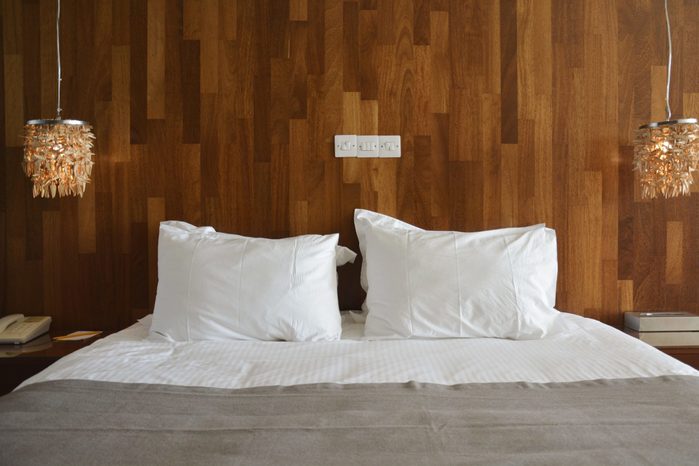
They might not change the bedspreads
The first thing you should do when you get into your hotel room? Don a pair of gloves and remove the bedspread from your bed. Seriously, don’t touch it. While new guidelines from the American Hotel & Lodging Association (AHLA) recommend that hotels change the bedding between guests, it’s just a recommendation, not a requirement. Pre-COVID, most hotels cleaned decorative bedspreads just four times per year, according to TravelTruth.com, so even if that rate has been upped, it might not be enough. And if that bedspread is colorful, it’s more likely that it’s one of those special ones that’s not changed regularly: It was created to look good and hide stains, saving the hotel money in the process since it doesn’t have to be washed for each new guest. So, which is safer: a hotel or an Airbnb? We investigated.
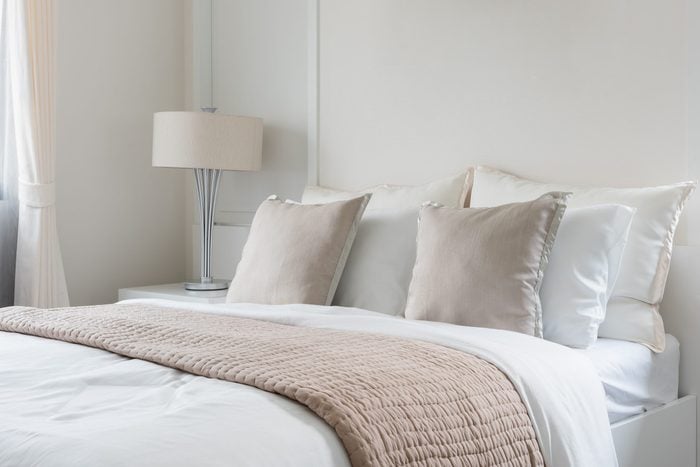
They don’t bother with the throw pillows
In the age of COVID, many hotels are getting rid of extra bedding items like throw pillows, as these decorative items aren’t washed between guests. But if they’re there when you arrive, take them off the bed right away. Why? When they inevitably end up on the floor, the housekeeping staff might simply pop those germ-laden throw pillows back onto your bed—touching your (possibly) clean pillowcases, according to Thrillist. Beyond that, they’re rarely, if ever, cleaned thoroughly. Increase your chances of having a clean hotel room by avoiding these hotel chains with the worst reputations in the industry.
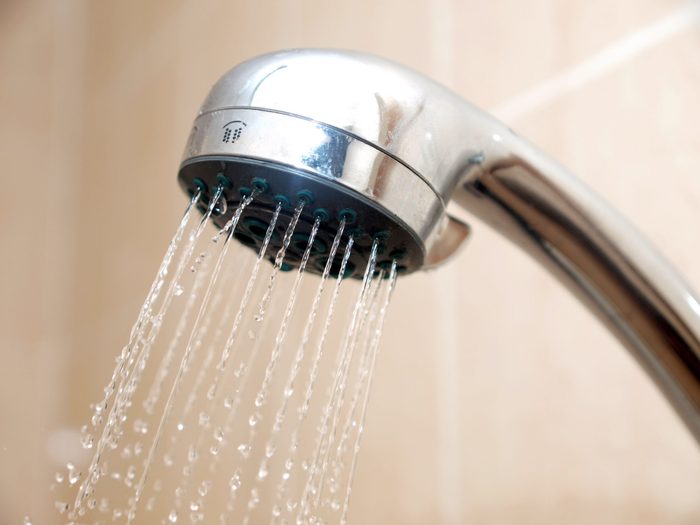
Some have poor water pressure
Hotels can save money by controlling the flow of water, according to the Hotel Association of New York City (HANYC). Conserving the flow of water not only saves on water costs, but it also saves money on energy and more—so the hotels may have actually installed low-flow devices. What does this mean for you? Aside from poor shower quality, you’ll also get linens that aren’t as clean. That’s a serious problem since the CDC recommends washing and drying hotel linens on the warmest and highest settings possible to kill COVID germs.
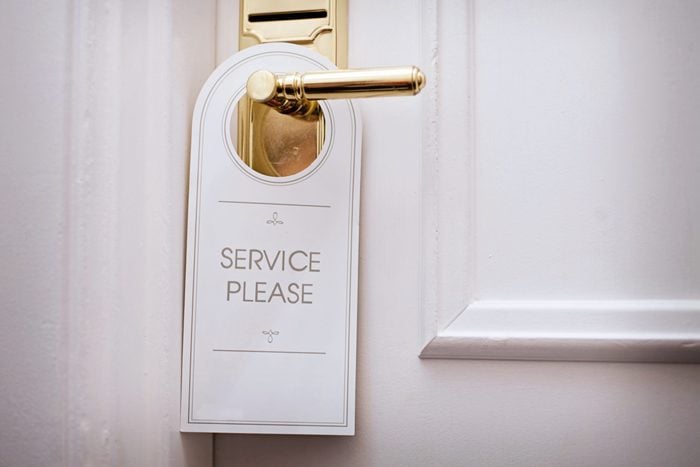
They skip cleaning days
Today, most hotels are skipping housekeeping days—and although we miss the freshness of our daily room cleaning, this is one that probably for the best. Pre-COVID-19, many offered guests a $5 per day credit if they chose not to have their room cleaned, or alternatively (depending on the hotel), they’d tack on additional costs for daily cleaning. Today, however, the majority of hotels aren’t cleaning your room unless you’re staying more than three nights. These hotels have realized that it’s not cost-effective, necessary, or even safe to do a thorough cleaning every day. While this means that no outsiders are entering your room (a good thing at the moment), it also means that your room may not be as clean as it could be, since it’s not getting its daily wipe-down. These are the 10 amenities slowly vanishing from hotel rooms.
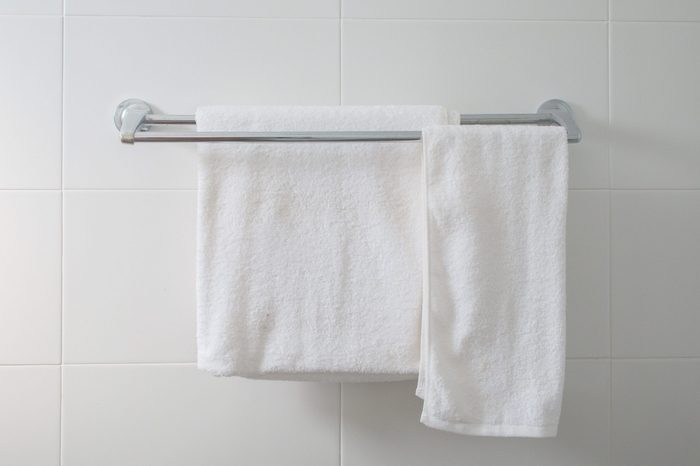
They don’t always change their towels
One effect of the cutback on daily housekeeping is that we’re reusing our towels for multiple days. Even before COVID-19, environmental concerns (not to mention money) prompted hotels to cut back on the wash loads. “They utilized the apathy of guests by stating that only towels left in the bath and shower will be changed,” says Jeremy Scott Foster, CEO of TravelFreak. “This can save hotels so much money on labor, detergent, and electricity.” Laundry makes up 16 percent of a hotel’s water usage, and by not washing those towels, the hotel can save on water, sewer, labor, and energy costs, according to National Geographic. This is one reuse we don’t actually mind since we’re the only ones using and reusing those towels during our stay.
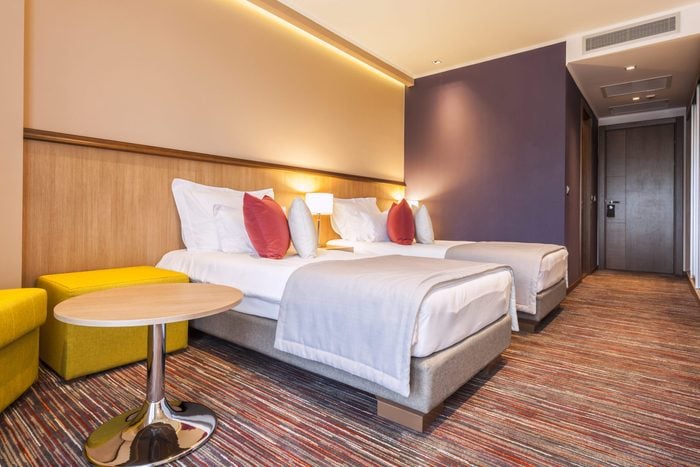
They choose colorful carpets on purpose
The purpose: to hide stains. Let your mind envision any stains you want, and chances are, they’re embedded in your lush, colorful carpet. Yes, tiles are easy to clean, but those colorful carpets can also be viewed as works of art, according to the industry website Hotel Management, so they’re technically doing double duty. The most recent popular colors include grays, brown tones, and non-directional designs with heavy layers of texture. Although the CDC does indicate to clean soft surfaces like carpets during COVID, it doesn’t give further specifications; one industry report, though, does mention that some hotels are moving toward installing more hard floors. For now, don’t sit on the carpet, and bring slippers.
For more on this developing situation, including how to stay healthy and sane, see our comprehensive Coronavirus Guide.
Sources:
- Emerging Infectious Diseases: “Detection of Severe Acute Respiratory Syndrome Coronavirus 2 RNA on Surfaces in Quarantine Rooms”
- Inside Edition: “Investigation Finds Sheets Weren’t Changed Between Guests at Some New York Hotels”
- Inside Edition: “For Sheets’ Sake! Multiple Hotels Do Not Change Bedsheets for New Guests, Investigation Reveals”
- Today: “Hidden cameras reveal how much (and how little) some hotel maids really clean”
- Santa Clara County Public Health Emergency Operations Center: “Mandatory Directive For Lodging Facilities (Including Hotels and Motels)”
- ABC News: “Undercover Investigation: Dirty Hotel Drinking Glasses”
- NBC Los Angeles: “50 LA Area Hotel Workers Test Positive For COVID-19”
- TravelTruth.com: “Do hotels clean the bedspreads after each stay?”
- Scientific Reports: “The coffee-machine bacteriome: biodiversity and colonisation of the wasted coffee tray leach”
- Traveller.com: “How often do hotels change their mattresses?”
- Thrillist: “9 Secrets Only Hotel Workers Know”
- Hotel Association of New York City: “Hotel Water Management: Guest Satisfaction through Balanced Flows”
- AHLA: “Enhanced Industry-Wide Hotel Cleaning Guidelines”
- National Geographic: “Hotels Save Energy with a Push to Save Water”
- Hotel Management: “Flooring future still includes rugs, carpeting”
- Hotel Management: “Pandemic drives change in hotel flooring design”
